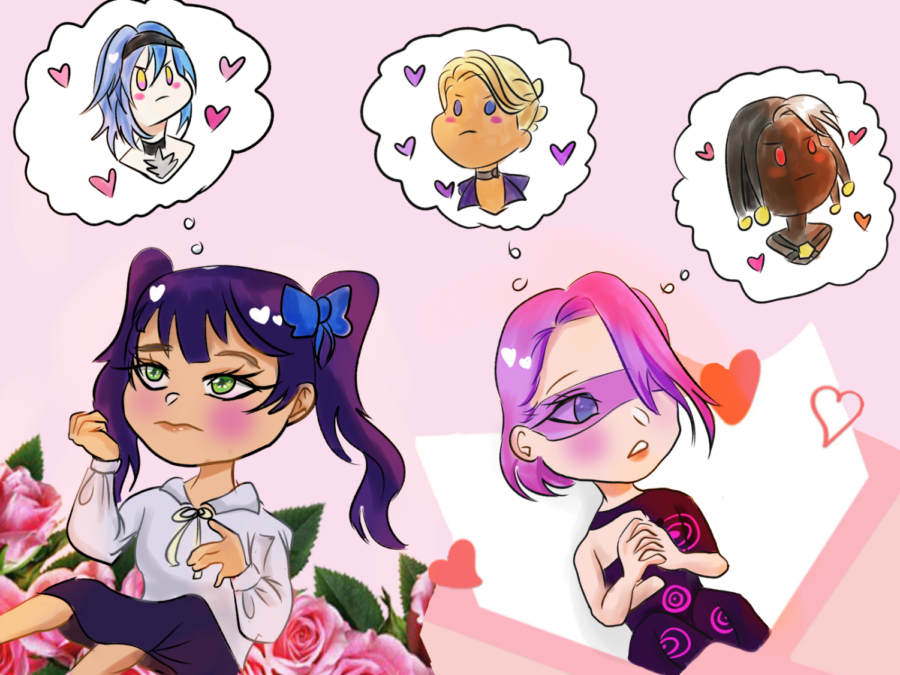‘It’s now or never’: a few thoughts on crushes
In elementary school, it was (relatively) easy to express your affection for a peer. Maybe you wrote a sweet mini love note on the back of a candy bar which you gave to them on Valentine’s Day. Or, maybe you confessed to your crush indirectly through your friend. In middle school, you could have snapped them because you would much rather admit your feelings behind a screen than in person. In high school, crushes may evolve into a relationship and people experiment with different partners. But, what does having a crush do to our body? Why do they cause us so much angst and how can we overcome that?
March 23, 2022
Although our middle school years are behind us, the periodic rapture and clichéd drama of crushes that filled them are decidedly not. RM students have certainly had their fair share of experience with navigating romantic feelings.
For some, it begins when a particular person repeatedly catches their eye. “When you have a crush, you start to pay attention to them a lot,” sophomore Alex Yeung said.
For others, the telltale sign is their desire to regularly see and interact with a person. “You seek them out during the day, and you get happy around them,” junior Sophia Wu said.
The thrill and mystery surrounding crushes might have to do with the absence of a concrete definition of the term, as well as the ambiguous origins of the emotions themselves. By popular interpretation, a crush seems to be a short-lived attraction toward another person that is based more in appearances and idealization than in real experiences with them.
Crushes are biologically evidenced by the brain’s release of certain neurotransmitters and the body’s accompanying responses: racing heart, sweaty palms, churning stomach. Such hallmarks of an infatuation can be attributed to norepinephrine and adrenaline, while the warm and fuzzy feelings typically associated with love are the effect of oxytocin.
It’s because of these neurotransmitters that scientists frequently equate crushes with addictions. Our brains release dopamine—the reward chemical—each time we see or think about a crush, which means that doing so produces the same neurological effects as a drug. The analogy isn’t so far-fetched, considering how tempting it is to obsess over a person—it’s literally rewarding.
Wu can relate to the irritation of being unable to stop thinking about a person. “It takes up time and effort and space in my mind,” she said. “It’s definitely a distraction from school.”
Even so, most people choose to continue preoccupying themselves with daydreams rather than confront their crush. The courage to reveal our feelings to someone consistently evades us.
A common reason for people’s reluctance to make the first move is, unsurprisingly, fear of rejection. Senior Deep Kaur has only admitted her feelings to a crush once, and even that is more than most dare to do. “Usually, I’m a very confident person but fear of rejection is a big thing for me,” she said. In the past, interacting with her crushes meant casually talking to them and getting to know them better instead of directly professing her feelings.
The time Kaur did confess to her crush was the result of an “in-the-moment” decision. “I was really nervous, but I said to myself, ‘You know what? It’s now or never,’” she said. Although nothing happened afterwards, by mustering the courage to tell him, she spared herself from regretting a missed opportunity later on.
Hesitance to admit feelings often leaves infatuations to fester and then gradually dissolve. “If you don’t spend a lot of time with them, you can’t find out things you like about them,” Wu said. “That, over time, causes emotions to fade.”
Another reason students give for choosing not to act on their feelings is a perceived pointlessness of it. “Dating in high school could be a good experience, but I couldn’t do it because I don’t have enough time to commit,” Yeung said. “Also, it’s really hard for it to last long-term.”
In some cases, however, crushes do blossom into a relationship. “The people I have actually really liked ended up confessing to me,” Wu said, who has formed relationships from those mutual crushes. “What I felt was a mixture of happiness and excitement.”
Romantic feelings are reciprocated more often than we imagine and confessing to a crush could very well make their day.
Social psychologists have also established that we tend to like people who like us: it’s the reciprocity of liking. Letting someone know how we feel, directly or indirectly, might just breed returned feelings.
At worst, a confession would simply elicit indifference. Yeung recalls not returning someone’s expressed feelings for him but retaining an unchanged friendship nonetheless. “I didn’t like her back so I wasn’t necessarily happy or anything,” he said. “[But] we were still cool.”
While crushes are often considered a trivial middle school preoccupation, that doesn’t mean a crush can’t catalyze a more meaningful relationship—but only by opening up is that possible.



